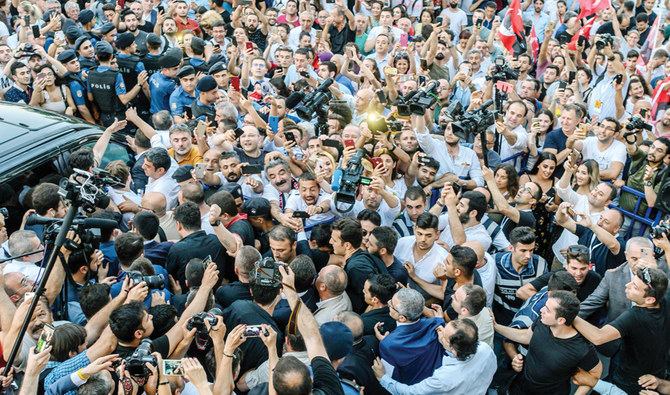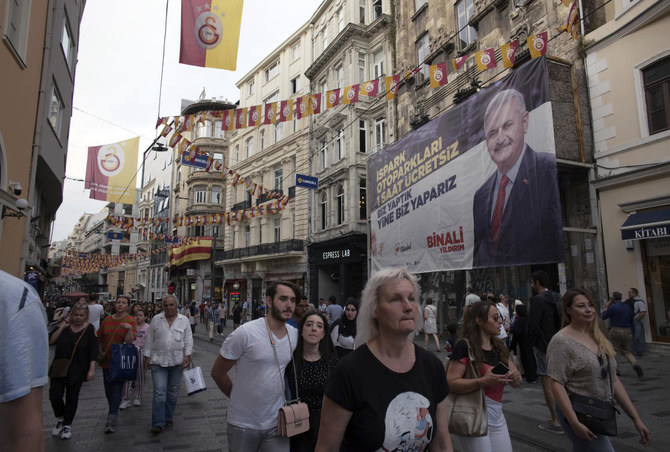ANKARA: In the re-run of the Istanbul mayoral elections on Sunday, residents of Istanbul once again voted for the opposition candidate Ekrem Imamoglu, who achieved a clear victory over his rival, Binali Yildirim, by about 54 percent of votes to 45 percent, a margin of 9 percentage points.
This was not the first time Imamoglu, a mild-mannered newcomer to politics standing for the Republican People’s Party (CHP), won the mayoral post of the country’s largest and most symbolic city.
He held this post for two weeks following the vote on March 31, which he won by 13,000 votes until the result was controversially annulled after allegations by the ruling Justice and Development Party (AKP) of unlawful staffing at the polling stations. This time the difference of votes was about 750,000.
During his short tenure, Imamoglu revealed the municipality’s $4.5 billion of debt, as well as the high number of donations funneled to the private foundations linked to the government.
As the stakes were high in this re-run, 8.6 million people went to the polls, even coming back from their summer breaks to vote.
Many residents of Istanbul who were interviewed by Arab News said that they wanted to take part of that historical turning point for Istanbul. A wind of change seems to be needed in Turkish political discourse.
Istanbul is a rich prize and an economic and cultural powerhouse, and losing the city once again to the opposition, this time by such a bigger margin, is likely to weaken the control of the ruling party, which lost control of several key cities on March elections, including the capital Ankara.
“If we lose Istanbul, we lose Turkey,” President Recep Tayyip Erdogan, who began his political career as a mayor of this city, has often cited.
According to Berk Esen, a political analyst from Bilkent University in Ankara, this is a colossal defeat not only for Binali Yildirim but also for Erdogan, who took the gamble of repeating this election.
“Istanbul was Erdogan’s stronghold and the main source of revenue for his party machine. After this election, the Turkish style presidency will come under intense criticism as Erdogan no longer seems to have majority support behind him,” he told Arab News.
Esen noted that Erdogan will need to share power and govern the country with input from other political figures, including those from the opposition ranks.
“The poor electoral showing will also embolden Erdogan’s critics within the AKP and accelerate the formation of splinter parties, either by his former ministers Ahmet Davutoglu or Ali Babacan, or possibly both,” he added.
For Ozgur Unluhisarcikli, Ankara director of German Marshall Fund of the United States, the main factor behind Istanbul election result is the sense of injustice in the Turkish society as a result of the invalidation of the first election.
FASTFACT
Imamoglu held this post for two weeks following the vote on March 31, which he won by 13,000 votes until the result was controversially annulled. This time the difference of votes was about 750,000.
“While Imamoglu had a clear and consistent strategy, Yildirim lacked one. By portraying himself as a centrist culturally, Imamoglu neutralized the tribal instincts of the AKP voters. Besides, AKP has lost the Kurdish voters, including the conservative Kurds who used to vote for AKP,” he told Arab News.
The result also showed that even with unfair election campaigning conditions, where the media is predominantly owned by pro-government outlets, an opposition candidate can still win such a critical post.
Amid several smear campaigns against Imamoglu, he was even compared by Erdogan to the Egyptian President Abdel Fattah El-Sisi, whom he accuses of holding power following a coup against Muhammad Mursi.
The high rates of inflation and unemployment, as well as the frustration over the controversial rerun decision of the previous elections, were cited as the key reasons behind the voters’ shift to the opposition.
“The majority of the Istanbul electorate — including many AKP voters — think that Imamoglu won the race the first time and was unfairly cheated out of his mandate. With the economic conditions dire and AKP candidate unchanged, there was very little reason for Imamoglu voters to change their minds,” Esen said.
According to Esen, in sharp contrast to Yildirim’s lackluster campaign, Imamoglu ran an energetic campaign with a superb public relations team that reacted positively to AKP attacks.
“Through their attacks, AKP officials offended different segments of the electorate,” he said.
With his campaign slogan “Everything will be fine,” Imamoglu sought to appeal some of the pious young people who are normally voters of the governing AKP, but were disillusioned by the latest developments in the country.
“Whether you are Turkish, Kurdish, Armenian, Greek, Circassian, I thank you,” Imamoglu said in his speech following the results.
“We are opening up a new page in Istanbul. On this new page, there will be justice, equality, love. We will stop the arrogance and waste. Today 16 million Istanbulites have refreshed our belief in democracy,” he added.
Turkey’s state-run Anadolu Agency has once again drawn harsh criticism as it began announcing initial results of the elections at 7:30 p.m. — 90 minutes later than they did in previous elections.
In the overall picture, Imamoglu defeated his rival in 29 of Istanbul’s 39 districts.
Pre-poll surveys also showed that Kurdish communities in Istanbul, who traditionally vote for the pro-Kurdish HDP, have increasingly supported Imamoglu since the controversial redo of the vote. Esen said that this helped to drive up Imamoglu’s numbers in districts where CHP base was historically weak.
“Against this colossal popular wave, the AKP campaign remained desperate and inconsistent,” he noted.



























